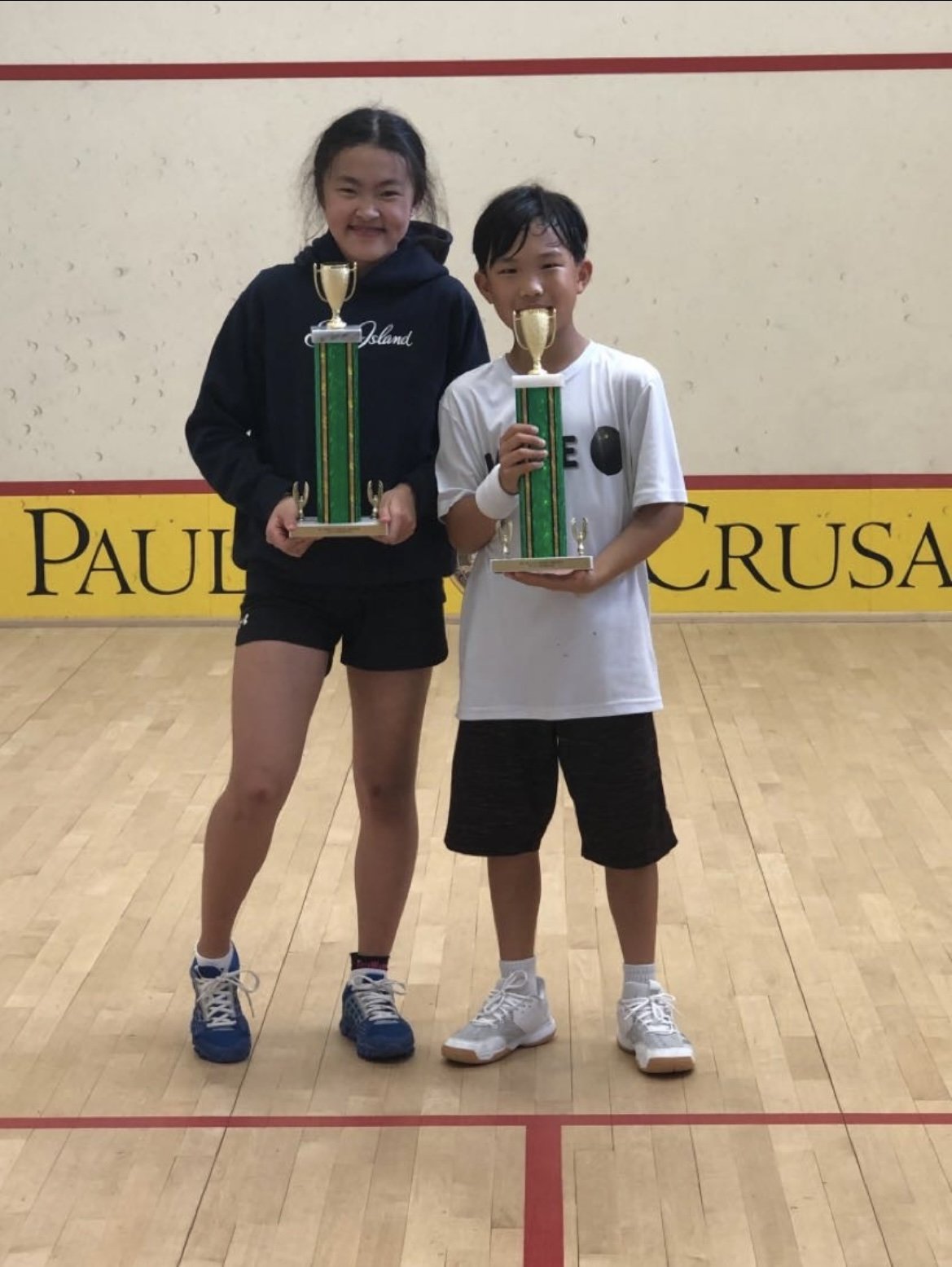Oh My God! - Calla Yim
Calla Yim, Bouncing Back’s Head of Operations, is a sophomore at St. Paul’s School in New Hampshire. Calla is a passionate squash player who faces various mental hurdles, especially during crucial matches. In Oh My God!, Calla talks about how she has learned to overcome these hurdles and mentally become a stronger athlete.
Squash, the only sport named after a vegetable, also happens to be the ‘healthiest sport in the world.’ Whilst squash is a very physically challenging sport, many people overlook how mental health ties into the sport.
I have always stood out as more energetic amongst my peers, always running around playing Cops and Robbers during recess. I am also an extreme perfectionist. If my results did not match the perfect scenario I created in my head, I would lose it. So, I always tended to physically overwork myself, both in sports and school. I always found Squash less stressful though, as I never thought I could go wrong with swinging a racket around in a room. Yet as I grew older, I slowly started to realize squash was much more than just hitting a rubber ball against a wall.
In the summer of 2019, I played my first ever Junior Gold Squash tournament. Out of the three levels in squash, gold, silver and bronze, I had finally made my way to the top and qualified for my first Gold level tournament in Cincinnati. Once I got to the venue, a fire began to spark in me. Seeing my name on the ‘up-next’ board was like a dream come true. I was the next one on court five to play the best best of five match I could. Three sets, I thought, I only need three sets to win.
Shake It Off, my sister’s favorite song that my family listened to on a daily basis, was playing in my head like a record player while I was on court. I was hitting a winning shot every other point, and I was making shots that I never made in practice, and I managed to win the first two sets of the match. Celebration music began to play in my head. All I needed was one more set to win, headline stories on US Squash were popping in my head titled ‘Underdog beats Amazing Squash Player’. All I needed to do now was step back onto the court, and then the match was basically mine to win, right?
Shot after shot, the referee was calling my shots ‘out’ like an annoying parrot. Instead of hearing the voice of Taylor Swift, the evil voice of my intrusive perfectionist thoughts were flooding my brain. Why would you do that? You're horrible. Oh my god you hit out again! Your parents are probably so disappointed right now. Why are you losing? Get a grip of yourself! That was such a bad shot. WHAT ARE YOU DOING!!?? Suddenly, the match was over. “Good game” my opponent said with a monotone voice. She came back from being two sets down. I only needed one more to win, but she got the three sets before me. This dream had quickly converted into a nightmare.
I've never been a sore loser. Yet this feeling of defeat was new to me, and it felt horrible. I was confused, angry and sad all at the same time, and I didn't know what to make of it. I couldn't help but sulk. From then on I started to lose confidence, I started to doubt myself and my squash playing abilities. I never wanted to play another tournament ever again, because I was scared of that feeling, the horrible feeling of defeat.
When I received an email advertising a Harvard squash camp in my area, I couldn't say no. Mike Way, the coach at Harvard University, held these very special college camps only a few times a year during the summer, so they filled up very quickly. The reason for their popularity was its mental sessions. It was confusing to me that there was a dedicated time for training our mind. I always thought that squash was a more physical sport, so why would we spend half our time talking about our mental?
The camp was great, Coach Way put us through physically challenging training sessions everyday, along with his informational mental sessions. I often tuned out when the mental sessions came around, but I vividly remember one lesson from camp that has stuck with me since; it was about the ‘Oh My God’ factor. “I know everyone in this room has at least had one ‘Oh My God’ moment. You tell yourself “Oh my god what are you doing?” or “Oh my god you suck.” Well, stop doing that! You’re only letting your opponent win you over! By letting the ‘Oh My God’ factor factor into your performance, you’re giving up! Be nice to yourself. Instead of ‘Oh My God’, here are some examples of nice things to say to yourself:...” As Coach Way went on by listing positive thoughts to say to ourselves during a match, I started to reflect on my past match against my opponent in Cincinnati: Is that why I lost in Cincinnati? Because I was mentally weaker? No matter how much faster I get, how much stronger, how much better, as long as I keep doubting myself, I’ll never win. So, all I have to do is believe in myself? Huh, okay.
It wasn’t until about three months ago that I truly understood what Coach Way was talking about. In December, I performed in a Junior Championship tournament at Penn University’s Squash Center. This tournament was right above the gold level, making it the highest level tournament a junior squash player can play. I had just moved up age groups, so this would be my first tournament playing under the GU17 (girls under seventeen) division. My first two matches were great, until my third, which was against the sister of the girl I played in Cincinnati.
She was much bigger and stronger than her younger sister. Her shots were like bullets. God, what am I going to do? I thought to myself. I don’t know if I’ll make it out of this one alive.
Once the match started, I made a mistake on the first shot I hit. It hadn’t even been a second into the match, and I already hit a horrible shot. Oh my god, how could you be so stupid? You hit such a bad shot off a serve? That’s so embarrassing. I thought to myself. Soon enough, the ‘Oh My God’ factor had taken over my game. I wasn’t battling my opponent, anymore. I was battling myself.
“There are still three sets,” my coach said during the match break, “Focus in. You can still win this.” My opponent had already taken two sets, and she only needed one more to win the match. Just like I did in Cincinnati. “Thirty seconds for players on Court Five!” the referee exclaimed. Okay. I thought. Stop this right now. If Mike were here, he’d probably say “Be nice to yourself.” Yeah, that’s right. No more ‘Oh My God’s.’ Only “I can do this!” Just like that, I was back on court. Suddenly, the song I was listening to on the way to the courts was playing in my head. Fire Burning by Sean Kingston. Here we go.
There were no more ‘Oh My God’ moments after that. The only thing I could hear was the music. If I hit a bad shot, move on. If I make a mistake, forget about it. The music in my head was blocking all the negative thoughts from channeling, and all I could focus on was playing my best at this very moment. “11-8, match,” the referee suddenly called, “match to Calla Yim.” With a smile on her face, my opponent reached her hand out, “Good game”, she said. I did it, I won. I didn’t think I could do it in the beginning, but I did. Although I was happy to win the match, I was more proud of myself for winning the bigger battle. The battle against myself. I was able to shut down my negative intrusive thoughts and play my best squash. I finally understood what it meant, the value of being nice to yourself, the value of having a good mindset.
Now, every fifteen minutes before my match, I always talk to my mom. She is always the one to assure me that I am a good player, and always tells me before my matches to ‘Trust my skills.’ Now that I go to boarding school, that person has become my school squash coach, Coach Smith. “The biggest challenge on court is you. There are five possible sets you can play. Don’t be impatient, you can get three, whether you play three or five sets.” He always tells me this before I go on court, and it has been a huge benefactor to my performance.
Squash has taught me more than just how to run fast and how to hit winning shots. It has taught me the value of having a good mindset, the value of having confidence in yourself. I could train for hours and hours and still lose. As long as I believe in myself, I can perform my best. I just need to have a positive mindset, and be nice to myself. I have been able to apply this mindset outside of the court, as well. If I get a bad test score, it’s okay. No need to beat myself up for it, I can do better the next time. If I mess up when reading out loud in class, don’t be embarrassed. Just laugh it off and keep reading. Although I don’t always win, whether it’s in a squash competition or the competition of life, I’ve learned how to accept it. Although the outcome may not be what I want, I know that there is a reason for everything. I can learn from these experiences, I can learn from that shot I missed and hit a better shot the next time, I can learn from the test I did poorly on to ace the next one. I just have to have the right mindset. Squash truly is the healthiest sport in the world, physically AND mentally, which is what I love about it.



